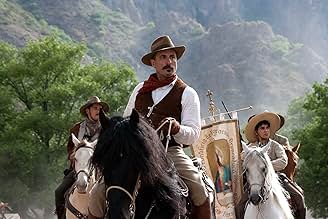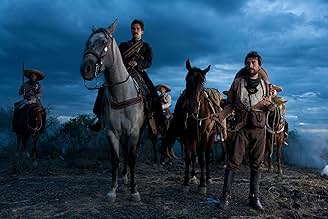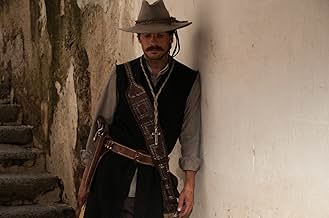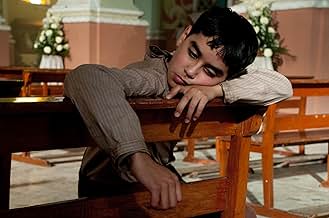IMDb रेटिंग
6.6/10
5.5 हज़ार
आपकी रेटिंग
अपनी भाषा में प्लॉट जोड़ेंA chronicle of the Cristeros War (1926-1929); a war by the people of Mexico against the atheistic Mexican government.A chronicle of the Cristeros War (1926-1929); a war by the people of Mexico against the atheistic Mexican government.A chronicle of the Cristeros War (1926-1929); a war by the people of Mexico against the atheistic Mexican government.
- पुरस्कार
- 3 जीत और कुल 9 नामांकन
Fernanda Urdapilleta
- Sandra Gorostieta
- (as María Fernanda Urdapilleta)
फ़ीचर्ड समीक्षाएं
"For Greater Glory" is an amazing film. It's an inspiring retelling of the the Cristeros War against the Mexican government for its having outlawed the Catholic Church and its executions and massacres of those who dared to live out their religious freedom.
The cast is top-notch and the direction pretty competent, keeping the story weaved among intimate scenes and battle scenes. Filled with poignant moments of the lives of the protagonists and of those close to them and with the heroic - as well as less than heroic - skirmish scenes.
It's a movie about taking sides courageously, how conflicting this can be in a man's conscience, especially when it involves the spilling of blood. If anything, the personal struggle of many characters getting into this war and carrying it out made the film shine. From the young boy who faced martyrdom for the Catholic faith - Jose Sanchez del Rio, beatified in 2005 - to his uncle, a cowardly mayor too enamored of power to save him.
I cannot help thinking how timely this film is when the Church and Catholics - for now - are again being curtailed in their freedoms by a government with its own agenda, this time the American government trying to limit the Church's ministry and to force Catholics to violate their consciences. Like Calles, Obama has presented the same arguments to justify his unjustifiable actions against the Church, Catholics and their institutions. It's government might over faith, the collective over the individual, an usurpation of the state to serve not the people, but an ideology.
PS: disregard most professional critics' reviews for they seem to have a chip on their shoulder so big that it blinds them to the artistic and cinematographic qualities of this film.
The cast is top-notch and the direction pretty competent, keeping the story weaved among intimate scenes and battle scenes. Filled with poignant moments of the lives of the protagonists and of those close to them and with the heroic - as well as less than heroic - skirmish scenes.
It's a movie about taking sides courageously, how conflicting this can be in a man's conscience, especially when it involves the spilling of blood. If anything, the personal struggle of many characters getting into this war and carrying it out made the film shine. From the young boy who faced martyrdom for the Catholic faith - Jose Sanchez del Rio, beatified in 2005 - to his uncle, a cowardly mayor too enamored of power to save him.
I cannot help thinking how timely this film is when the Church and Catholics - for now - are again being curtailed in their freedoms by a government with its own agenda, this time the American government trying to limit the Church's ministry and to force Catholics to violate their consciences. Like Calles, Obama has presented the same arguments to justify his unjustifiable actions against the Church, Catholics and their institutions. It's government might over faith, the collective over the individual, an usurpation of the state to serve not the people, but an ideology.
PS: disregard most professional critics' reviews for they seem to have a chip on their shoulder so big that it blinds them to the artistic and cinematographic qualities of this film.
There's no doubt that the subject matter of "For Greater Glory: The True Story of Cristiada" - the Cristeros War of Mexico in the late 1920s - could make for an interesting and even entertaining movie. But to tell the truth, I felt kind of unsatisfied at the end. One of the most expensive Mexican movies made (though low budget by Hollywood standards), I will say that the movie (for the most part) looks pretty good. But the movie is saddled with a substandard script. The movie is both too long and not long enough. It unfolds at a pretty slow pace, and there are a number of scenes that could have been eliminated. But at the same time, it doesn't go into detail enough on a number of important points. The motivations of the characters are more often than not vague, and there are a number of unanswered questions for those unfamiliar with this part of Mexican history. While I wouldn't call this movie terrible, it is unsatisfying. Though on a positive note, it will probably get you to do some research about this conflict.
As a Catholic very concerned about the anti-Catholic direction of our society, I wanted to see For Greater Glory. But after reading the reviews on RottenTomatoes, I assumed it would be a good message poorly presented. I could not have been farther from the truth. This was a excellent movie - especially for a directorial debut. Even if you are not Catholic you will find this movie very moving and well done.
Andy Garcia is excellent - he even shows intense emotions. Mauricio Kuri had an outstanding rookie performance. Nestor Carbonell's role was perfect for him. Peter O'Toole was a wonderful surprise if short lived.
Ignore RottenTomatoes - you will not be disappointed!
Andy Garcia is excellent - he even shows intense emotions. Mauricio Kuri had an outstanding rookie performance. Nestor Carbonell's role was perfect for him. Peter O'Toole was a wonderful surprise if short lived.
Ignore RottenTomatoes - you will not be disappointed!
The film hijacks a complex social conflict and turns it into a David and Goliath story of good guys versus bad. In so doing, it whitewashes the historically reactionary role of the Catholic Church in Mexico. One cannot imagine how such an approach would convince or educate any viewer, including those not at all familiar with the history of this conflict. As befits a one-dimensional propaganda film, the performances are mostly flat and cartoonish.
It is ironic that a movie that purports to represent a popular struggle in defense of religion pointedly ignores the main protagonists: the peasants themselves, both as individuals and in their collective action. Throughout the movie, neither the peasant forces, nor the government soldiers that are sent against them are ever depicted as real human beings.
This movie's celebration of faith and charisma—reduced to the cry 'Long Live Christ the King!'—is a crude effort to obscure the underlying class conflicts that gave rise to the real Cristeros, a social movement that is not widely understood .... Victorious in the Mexican Revolution, the Constitutionalist Army, led by Venustiano Carranza, Álvaro Obregón and Calles, had defeated the peasant armies of Pancho Villa and Emiliano Zapata. The new regime was incapable of resolving a central issue over which the Revolution had been fought, the redistribution of land.
The slow and erratic pace of land distribution under Carranza, Obregón and Calles confirmed to the peasantry the military government's timidity in confronting the large and powerful landowners. The immense properties of the church constituted an important source of economic stagnation and social instability. Efforts in the 19th century to force the church to rent out its land to others, let alone to surrender ownership, met with fierce opposition.
According to historian Jesús Silva Herzog the peasantry and the working class confronted a "demonic triumvirate:" the great landowners, the military, and the Church. "Three tragic words define Mexican history: haciendas, sacristy and barracks." Lacking a revolutionary party and isolated from the workers, the rebellion of Mexican peasants was hobbled by the Catholic Church. Desperate peasant and Indians threw themselves into battle during the Cristero War ideologically imprisoned by Catholic dogma.
Had the Cristero War merely pitted the government of President Calles against the Catholic establishment, it is unlikely that the unprecedented brutality—the mass repression of peasants, the burning and looting of their towns—would have taken place. Historically, ruling classes reserve this kind of gross brutality to the rebellion of the most oppressed: peasants, workers or slaves.
It is ironic that a movie that purports to represent a popular struggle in defense of religion pointedly ignores the main protagonists: the peasants themselves, both as individuals and in their collective action. Throughout the movie, neither the peasant forces, nor the government soldiers that are sent against them are ever depicted as real human beings.
This movie's celebration of faith and charisma—reduced to the cry 'Long Live Christ the King!'—is a crude effort to obscure the underlying class conflicts that gave rise to the real Cristeros, a social movement that is not widely understood .... Victorious in the Mexican Revolution, the Constitutionalist Army, led by Venustiano Carranza, Álvaro Obregón and Calles, had defeated the peasant armies of Pancho Villa and Emiliano Zapata. The new regime was incapable of resolving a central issue over which the Revolution had been fought, the redistribution of land.
The slow and erratic pace of land distribution under Carranza, Obregón and Calles confirmed to the peasantry the military government's timidity in confronting the large and powerful landowners. The immense properties of the church constituted an important source of economic stagnation and social instability. Efforts in the 19th century to force the church to rent out its land to others, let alone to surrender ownership, met with fierce opposition.
According to historian Jesús Silva Herzog the peasantry and the working class confronted a "demonic triumvirate:" the great landowners, the military, and the Church. "Three tragic words define Mexican history: haciendas, sacristy and barracks." Lacking a revolutionary party and isolated from the workers, the rebellion of Mexican peasants was hobbled by the Catholic Church. Desperate peasant and Indians threw themselves into battle during the Cristero War ideologically imprisoned by Catholic dogma.
Had the Cristero War merely pitted the government of President Calles against the Catholic establishment, it is unlikely that the unprecedented brutality—the mass repression of peasants, the burning and looting of their towns—would have taken place. Historically, ruling classes reserve this kind of gross brutality to the rebellion of the most oppressed: peasants, workers or slaves.
An under the radar film about a subject I knew nothing about that absolutely floored me. It's a high quality film with flat out superb performances that makes you contemplate and appreciate faith and freedom like few films have ever managed to convey. Yes, it is a faith based film. If that offends some, then this isn't the movie or the subject for you. Unlike other faith based efforts, this effort is not cheesy or ham-fisted or even preachy.
It's the tale of the Cristeros War (1926-1929); a war by the people of Mexico against the Mexican government who cracked down in brutal ways against the Catholic Church and against religious freedom in general. Andy Garcia is Oscar level good here as General Gorostieta, a man with limited faith who responds and masterfully leads the fight for freedom. It's intense and, at times, surprisingly violent and impactful. This movie delivers real emotion and doesn't dodge tough questions about faith. It delivers an exceptional balance of showing why people behave and choose to engage in certain behaviors even when such behavior is contrary to the core of their belief system.
One thing is certain; no one who has faith will take it or their religious freedom for granted after watching and EXPERIENCING this film. That's how it registered with me at any rate.
It's the tale of the Cristeros War (1926-1929); a war by the people of Mexico against the Mexican government who cracked down in brutal ways against the Catholic Church and against religious freedom in general. Andy Garcia is Oscar level good here as General Gorostieta, a man with limited faith who responds and masterfully leads the fight for freedom. It's intense and, at times, surprisingly violent and impactful. This movie delivers real emotion and doesn't dodge tough questions about faith. It delivers an exceptional balance of showing why people behave and choose to engage in certain behaviors even when such behavior is contrary to the core of their belief system.
One thing is certain; no one who has faith will take it or their religious freedom for granted after watching and EXPERIENCING this film. That's how it registered with me at any rate.
क्या आपको पता है
- ट्रिवियाPartially financed by the Knights of Columbus, whose members in both the United States and Mexico were an integral part of the actual Cristeros Rebellion.
- गूफ़Jose gives up his white horse to another christero during a battle and hides in the rocks. When the other christero comes back to look for Jose, he is on a brown horse.
- भाव
Father Christopher: Who are you if you don't stand up for what you believe? There is no greater glory than to give your life for Christ.
- क्रेज़ी क्रेडिटNear the end of the credits, "Batman" is credited as a painter.
- कनेक्शनFeatured in The Secret Masonic Victory of World War Two (2022)
टॉप पसंद
रेटिंग देने के लिए साइन-इन करें और वैयक्तिकृत सुझावों के लिए वॉचलिस्ट करें
- How long is For Greater Glory: The True Story of Cristiada?Alexa द्वारा संचालित
विवरण
बॉक्स ऑफ़िस
- बजट
- $1,20,00,000(अनुमानित)
- US और कनाडा में सकल
- $56,72,846
- US और कनाडा में पहले सप्ताह में कुल कमाई
- $18,85,608
- 3 जून 2012
- दुनिया भर में सकल
- $1,01,73,682
- चलने की अवधि2 घंटे 25 मिनट
- रंग
- ध्वनि मिश्रण
- पक्ष अनुपात
- 2.35 : 1
इस पेज में योगदान दें
किसी बदलाव का सुझाव दें या अनुपलब्ध कॉन्टेंट जोड़ें

टॉप गैप
What is the Brazilian Portuguese language plot outline for For Greater Glory: The True Story of Cristiada (2012)?
जवाब




































